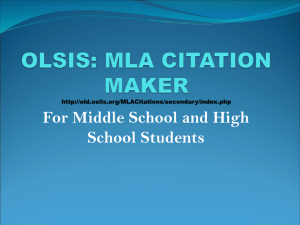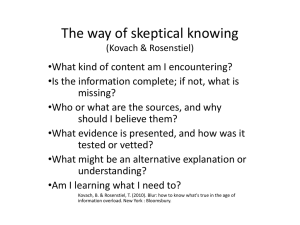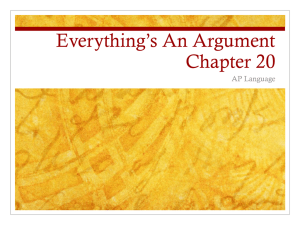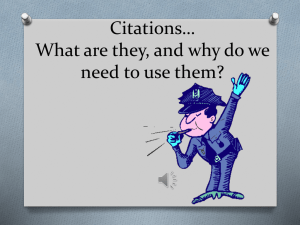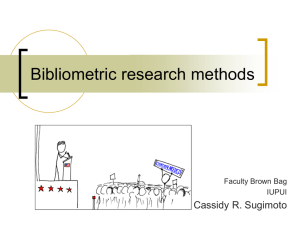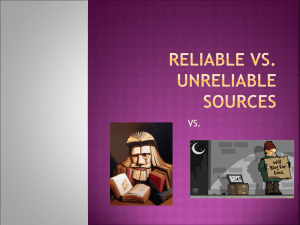Presentation Title
advertisement
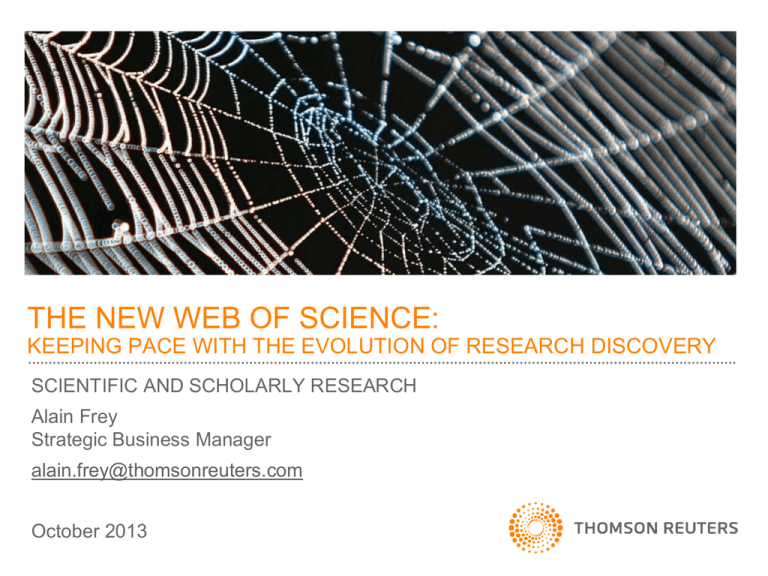
THE NEW WEB OF SCIENCE: KEEPING PACE WITH THE EVOLUTION OF RESEARCH DISCOVERY SCIENTIFIC AND SCHOLARLY RESEARCH Alain Frey Strategic Business Manager alain.frey@thomsonreuters.com October 2013 THE NEW WEB OF SCIENCE Keeping Pace with the Evolution of Research Discovery 1 THE EVOLUTION OF RESEARCH CONNECTING PEOPLE, CONTENT AND WORKFLOWS THROUGH CITATIONS Thomson Reuters Web of Science provides a single destination to access for the world’s largest collection of research data, publications, proceedings and patents. It started with an idea… …that grew into the world’s most trusted resource… … and continues to evolve with the pace of research. More than half a century ago, Dr. Eugene Garfield discovered that citations could help navigate the information flood and gauge the impact of journal literature. Web of Science is the premier resource for research discovery. Our content and tools are trusted by more than 6,000 of the world’s leading organizations driving scholarly research and scientific policy. The next generation of Web of Science brings together the most trusted source of scholarly content and the new standards in online search in one intuitive easyto-use environment. 2 THE EVOLUTION OF RESEARCH Innovations to Enhance Search & Discovery We are excited to introduce several key enhancements to the Web of Science that will help our customers transform the way they search for and assess the quality of research content. Easier Research RESEARCH Discovery The Most Comprehensive PRODUCING Citation Content ORGANIZATIONS Web of Science and Google Scholar are forging a unique collaboration to make the Web of Science instantly discoverable and bringing the power of our citation connections to the open web. Web of Science customers will be able to view and access Web of Science Times Cited Counts and records directly from a Google Scholar search. Reciprocal links will provide an easy path to full-text with links back out to Google Scholar. We are bringing new regional content to Web of Science customers and making full text seamlessly available for open access journals. The October launch of the new SciELO Citation Index, trial access to the Chinese Science Citation Database and the upcoming 2014 launch of the new Korean Journal Database brings even more quality, impactful regional content to what is already the largest and most authoritative citation resource. A Better Research Tool In January, the Web of Science will have an all new look and feel. This release directly addresses customer requests for a more intuitive and easier search experience – while maintaining the advanced search capabilities our seasoned researchers and power users expect. STRONG BRAND Developed with the emerging needs of the researcher in mind, our January release will provide a simpler search and discovery environment all branded under the banner of the Web of Science. 3 THE NEW WEB OF SCIENCE Enabling Easier Research Discovery 4 EASIER RESEARCH DISCOVERY While the open web is the often starting point, it is not the ultimate destination. Web of Science remains the primary resource for accessing quality and impactful research. Our new collaboration with Google Scholar facilitates the seamless movement between the open web to the next generation of Web of Science and its trusted content through citations. Citation connections that now meet the researcher where their search begins. Saves researcher’s time by fitting within their existing workflow Simplifies the discovery process Makes it easier to access full text 5 WEB OF SCIENCE AND GOOGLE SCHOLAR Easier Research Discovery Times Cited counts and direct links to the Web of Science are presented within Google Scholar search results. This is the Web of Science Citing Articles Summary Page as displayed to a entitled user. A link back to the Google Scholar results is provided. WEB OF SCIENCE AND GOOGLE SCHOLAR Easier Research Discovery Clicking on button in Web of Science launches a search on Google Scholar. Google Scholar automatically displays link to full text, at user’s university if available based on IP address. WEB OF SCIENCE AND GOOGLE SCHOLAR Easier Research Discovery This is the Web of Science Citing Articles Summary Page as displayed to a user without complete entitlement. The page is a limited listing of cited articles, and allows user to view static version of full records and Citation Results based on their subscription. THE NEW WEB OF SCIENCE Delivering the Most Comprehensive Citation Content 9 THE MOST COMPREHENSIVE CITATION CONTENT Starting with the trusted collection of high-impact content, the Web of Science uses citation connections to map paths from core literature to the broadest set of citation content available. Citation Connections that help researchers trace the path from idea to discovery to development. Increases access to content from rapidly emerging and increasingly influential regions Provides citation connections that can be followed across regions, subjects, and content types Makes historical yet highly influential research easily accessible As part of our commitment to regional content expansion, we will continue to partner with local academic and government organizations to deliver regionally relevant, multidisciplinary resources. 10 THE LATEST REGIONAL CONTENT ADDITION SciELO Citation Index Our collaboration with the Scientific Electronic Library Online (SciELO) will bring greater visibility and improved access to research from emerging economies, particularly in Latin America, the Caribbean, South Africa, and developed Latin-language areas including Spain and Portugal. Approximately 650 titles RESEARCH PRODUCING Over 350 new titles added to ORGANIZATIONS content covered by Web of Science Over 4 million Cited References All titles are open access with links to full-text at SciELO site Weekly updates from SciELO Brazil data feed The same core feature set as other Web of Science resources 11 SCIENCE CITATION INDEX EXPANDED • 41.2 million records • 1900-present SOCIAL SCIENCES CITATION INDEX • 7.9 million records • 1900-present ARTS & HUMANITIES CITATION INDEX • 4.6 million records • 1975-present CONFERENCE PROCEEDINGS CITATION INDEX • 8.2 million records • 1990-present BOOK CITATION INDEX • 977,000+ records • 2005-present CURRENT CHEMICAL REACTIONS • 212,500+ records • 1985-present INDEX CHEMICUS • 337,000+ records • 1993-present DATA CITATION INDEX • 3.4 million records • 1835-present CURRENT CONTENTS CONNECT • 18.1 million records • 1998-present BIOSIS CITATION INDEX • 22.8 million records • 1926-present ZOOLOGICAL RECORD • 4 million records • 1864-present MEDLINE • 22 million records • 1950-present DERWENT INNOVATION INDEX • 22.9 million basic inventions • 1963-present CHINESE SCIENCE CITATION DATABASE • 3.6 million records • 1989-present NEW: SciELO CITATION INDEX • 317,000+ records • 2002-present COMING IN 2014: KOREAN JOURNAL DATABASE • And more… 12 Counts as of October 2013 MILLIONS OF WEB OF SCIENCE RECORDS CONNECTED WITHIN ONE SINGLE RESOURCE Web of Science Core Collections Unified subject classification Conference Proceedings Citation Index Book Citation Index Coverage from 1864 Data Citation Index Current Chemical Reactions BIOSIS Citation Index Index Chemicus Thomson Reuters Web of Science Cited references from 1900 Derwent Innovation Index Current Contents Connect 24,000+ journals Zoological Record Medline Regional Citation Indexes 90 Million + records DELIVERS UNMATCHED QUALITY AND QUANTITY More Records. More Content. More Citation Connections. Web of Science 90,000,000+ Records 800,000,000+ cited references Other Providers 50,000,000+ Records Limited cited references only available to 1996 More Content Types. Web of Science Other Providers Journals 24,700 21,000 Books 50,000 7,600 Conference Proceedings 6.5 Million+ records 5.3 Million records Patents 51.8 Million+ 25.2 Million Data Studies & Data Sets 2.6 Million + NONE More Subject Coverage. Web of Science Other Providers Asia-Pacific 4,000 2,600 Europe 11,500 9,900 4,500 journals Latin America 1,300 600 900 575 1,500 journals Middle East & Africa North America 7,000 6,800 Web of Science Other Providers Sciences 19,500 journals 14,000 journals Social Sciences 5,300 journals Arts & Humanities 2,500 journals More Regional Journals. THE NEW WEB OF SCIENCE Providing a Better Research Tool 15 A BETTER RESEARCH TOOL The next generation of Web of Science brings together the most trusted source of scholarly content and the new standards in online search in one simple environment based upon the principles of Citation Connections. Delivers a simplified search experience while maintaining advanced capabilities RESEARCH PRODUCING ORGANIZATIONS Provides clear search results that make it easy to uncover citation connections Integrates metrics and indicators to support faster, analytics-based discovery These same connections provide the foundation for the most trusted normalized indicators used to measure influence and research evaluation via InCites. Metrics that are now embedded back in the search environment to support guided discovery. 16 THE NEW WEB OF SCIENCE A Better Research Tool THE NEW WEB OF SCIENCE A Better Research Tool Modern, Simplified, Intuitive, Efficient •Updated user interface •Easier to get started searching •Simpler and more intuitive navigation •Clear identification of the database searched and easy toggle to change THE NEW WEB OF SCIENCE A Better Research Tool Intuitive Search •Simplified ‘one box’ search with ability to expand or change the type of search •Simplified navigation and grouping of functional controls •Expanded search fields available with one click THE NEW WEB OF SCIENCE A Better Research Tool Clearer Results •Improved page layout and readability of search results •New spell-check “did you mean” functionality •Easier links to full-text THE NEW WEB OF SCIENCE A Better Research Tool Clearer Results •New layout of full record data elements for easier readability Exposed Connections •New organization of links to related research in “Citation Network” panel on right • Connections to Citing Articles, Cited References, Related Records within Web of Science and other collections THE NEW WEB OF SCIENCE A Better Research Tool Integrated metrics and indicators •New Journal information panel including JCR Journal Impact Factor •New “Hot” and “Highly Cited” paper indicators integrated from Essential Science Indicators Subscription to InCites required THE NEW WEB OF SCIENCE A Better Research Tool Improved ranking capabilities •Ability to access and explore the underlying ESI data •Ability to view Highly Cited people, departments and labs •Identify Highly Cited designations within data sets Subscription to InCites required THE NEW WEB OF SCIENCE A Better Research Tool Deeper journal analytics •Conduct analysis of citation relationships across journals and categories •Create institution-specific views of journal use to localize analysis •Expanded indicators and trend analyses Subscription to InCites required Keep Pace with the Evolution of Research. Follow the Citation Connection. Uncover Brilliant Results. IN THE NEW WEB OF SCIENCE 25
